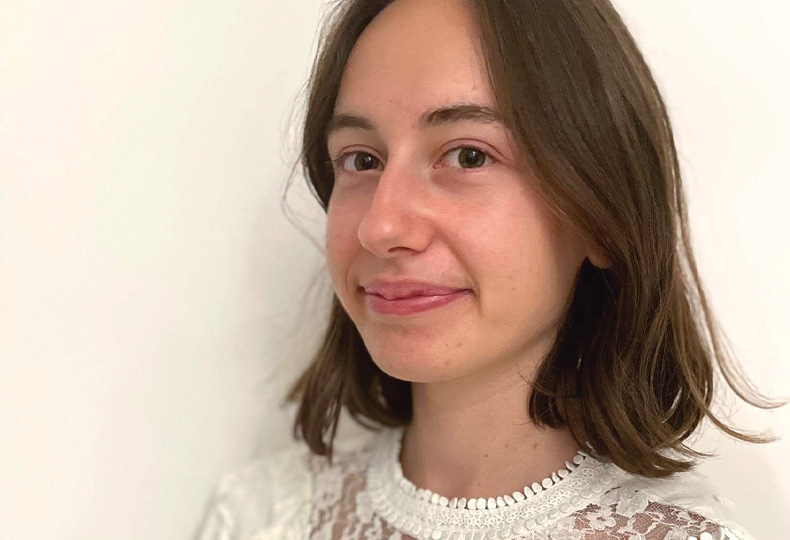Mathilde Dupouy, Aggregation major in computer engineering

Mahilde Dupouy, a graduate of the Ecole Normale Supérieure, is this year's winner of the Agrégation des Sciences pour l'Ingénieur, with a specialization in computer engineering.
Congratulations!
What is your career path?
After a Terminale S SVT specializing in mathematics, I entered the Prépa Clemenceau in Nantes in MPSI and then PSI*. I chose the PSI rather than the MP because I was already attracted to the industrial sciences, as they enable us to understand the objects that surround us and their behavior.
I took the competitive entrance exam in 2020 and was admitted to ENS Paris-Saclay. I had also applied there on the basis of a portfolio. The first year, called SAPHIRE, is common to all three departments in this division: mechanical engineering, civil engineering and Nikola Tesla (electrical engineering). In particular, it was the visits to the laboratories and the topics covered that confirmed my choice.
I went on to do a Master 1 in the Nikola Tesla department (formerly EEA), the department in which I'm enrolled today.
I was more attracted to this department during my first year at ENS Paris-Saclay, in particular because I discovered the many facets of what is known as electrical engineering. There's a section on electronics and energy conversion, but also a major section on signal and image processing, both theoretically and implemented digitally, and on industrial computing.
Why did you choose a Master's degree in Higher Education Training (FESup)?
The choice of a FESup master's degree as a specific year (diploma course) came about quite naturally for me. Indeed, when I chose to enter ENS Paris-Saclay rather than an engineering school after the competitive entrance exams, it was partly because I've always enjoyed sharing knowledge, and I realized when I made this choice that I wanted to have a teaching part in my future activity.
Preparing for the agrégation is not the only advantage of a FeSup master's degree. The courses prepare students for the agrégation and therefore enable them to consolidate their knowledge of a broad base of industrial sciences in general and in their speciality, but they are also Master 2 courses and are therefore designed to deepen and broaden their knowledge in relation to current research. Some of the teaching units (UE) offered were of particular interest to me when I chose this Master's degree, such as the "High Performance Computing" UE and the "Wavelets" UE, which have indeed proved fascinating!
What is the "computer engineering" option?
There are four agrégations in industrial science: mechanical engineering, construction engineering, electrical engineering and computer engineering.
- The first two are prepared in the Mechanical Engineering (GM) and Civil Engineering (GC) teaching and research departments respectively;
- The last two correspond to two masters degrees in the Nikola Tesla department. I enrolled in the M2 FESup INTRANET (engineering INformatics TRaitement du signal, Automatique, électronique NumÉrique et Télécom), in which the computer engineering option is prepared.
One of the three written exams and one of the three oral exams is common to all four options, so you need knowledge in all four fields! The computer engineering specialization focuses on the principles of programming and its implementation in different languages, knowledge of computer/microcontroller and network architecture, signal processing, automatic control, digital electronics and telecommunications.
What are your career plans?
I would like to do a Master 2 in research next year as the fourth year of the ENS diploma.
The master I'm interested in is the MVA (Mathematics, Vision and Learning), which is a master's degree in applied mathematics and would enable me to develop my knowledge with a more mathematically-oriented approach in the fields I'm interested in, namely signal and image processing and learning, while keeping a resolutely application-oriented vision in various fields.
In particular, I think that these methods have a lot to contribute to research in biology, and I'd like to do research at this interface.
This Master's degree is also a stepping stone towards a PhD, which I'd like to do later, with the ultimate aim of becoming a teacher-researcher.
What would you say to students who are hesitating about coming to ENS Paris-Saclay or taking the agrégation?
It's normal to hesitate when it's time to make a choice, and I think it's important to find out all you can about the schools, to see if you see yourself in the courses or values that the school puts forward. In particular, at ENS Paris-Saclay, the third (or fourth) year is a year in which you can choose between several courses, including the possibility of joining an M2 FESup and taking the agrégation, which will help you to better grasp the opportunities offered by the school.
